If you’re a fan of the unique flavor and texture of persimmons, you’ll be happy to know that there are several fruits out there that share similar characteristics. Whether you’re looking for a substitute or just want to try something new, these persimmon alternatives can add variety to your diet.
One fruit that is similar to persimmons is the medlar. It has a velvety texture and a sweet yet acidic taste, making it a great persimmon substitute in desserts and preserves. Another option is the black sapote, which has a soft and squidgy texture with a flavor profile that resembles chocolate pudding.
Sapodilla is a fruit that shares similarities with persimmons in appearance, with a sweet and grainy flesh reminiscent of a pear mixed with brown sugar. Quince, on the other hand, might not look like persimmons, but it has a similar flavor profile with sweet and acidic notes.
If you want a playful twist, try orange peach tomatoes. These tomatoes resemble fully ripe persimmons and have a sweet and juicy flavor that can be used in both sweet and savory recipes. Apricots and mangoes are also great options, with their sweet and flavorful taste.
For a tropical twist, papayas can be used as persimmon substitutes. They have a sweet and juicy flavor and are versatile in both sweet and savory dishes. Pears and sweet potatoes are other great alternatives, adding a fresh and sweet taste to your recipes.
Overall, there are plenty of fruits that can provide a similar taste or texture to persimmons. Whether you’re experimenting in the kitchen or searching for alternatives, these fruits can be a delightful addition to your dishes.
Key Takeaways:
- Medlars, black sapote, sapodilla, and quince are fruits similar to persimmons with unique flavors and textures.
- Orange peach tomatoes, apricots, mangoes, and papayas offer playful and tropical alternatives to persimmons.
- Pears and sweet potatoes can be used to add a fresh and sweet taste to your recipes.
- Experiment with different substitutions and enjoy exploring the world of fruits similar to persimmon.
- Remember to adjust sugar levels when using persimmon substitutes, as their sweetness may vary.
Medlar
Medlar is a fruit that is only edible when it is fully ripe. It has a velvety texture and a sweet yet acidic taste, similar to persimmons. Medlars can be enjoyed on their own or used in various preparations such as desserts and preserves. They can be transformed into jam or mixed with oat cream for a delicious treat.
If you’re looking for a fruit similar to persimmon, medlar is a fantastic option. Its unique texture and flavor make it a great substitute or alternative in recipes that call for persimmons. Whether you enjoy it as a standalone fruit or incorporate it into various dishes, medlar is sure to add a touch of sweetness to your culinary creations.
Black Sapote
Black sapote is a fruit similar to persimmon and can be a great alternative if you’re looking for something new and exciting to try. This fruit has a soft and squidgy texture, much like persimmons, making it a delightful addition to your fruit collection.
Known for its unique flavor profile, black sapote offers a rich taste that resembles chocolate pudding with a hint of caramel. It’s a true treat for your taste buds!
You can find black sapote in Mexican or South American grocery stores, and it’s typically enjoyed fresh or used in various recipes. Whether you choose to scoop it out with a spoon and savor it alone or incorporate it into your favorite desserts, this fruit is guaranteed to make a lasting impression.
| Black Sapote | Persimmon |
|---|---|
| Soft and squidgy texture | Soft and jelly-like texture |
| Rich flavor resembling chocolate pudding and caramel | Sweet and slightly tangy flavor |
| Can be enjoyed fresh or used in recipes | Can be eaten fresh or used in various culinary applications |
So, if you’re in search of a persimmon alternative, don’t miss out on the wonderful black sapote. Give it a try and indulge in its delectable flavors!
Sapodilla
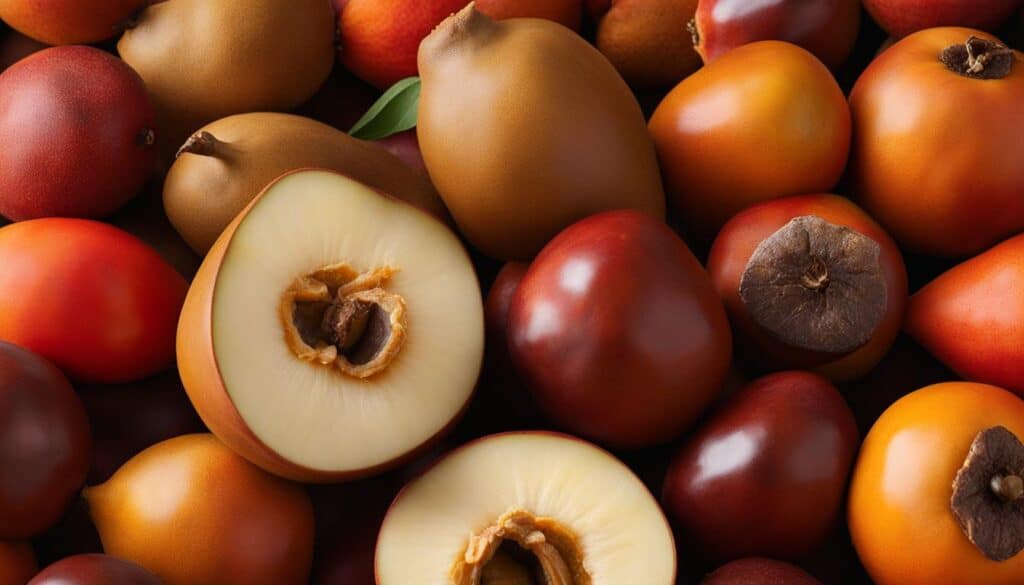
When it comes to fruits similar to persimmon, sapodilla is worth mentioning. This tropical fruit is visually reminiscent of persimmons with its brown, rough, and slightly fuzzy exterior. But what about its flavor and texture?
Sapodilla has a unique taste that combines the sweetness of a ripe pear with the caramel-like richness of brown sugar. Its flesh is wonderfully grainy, providing a delightful textural experience. When fully ripe, sapodilla offers a flavor profile reminiscent of pumpkin pie, making it a perfect choice for those who enjoy the warm and cozy autumnal flavors.
However, it’s important to note that unripe sapodillas can leave a chalky feeling in the mouth, just like unripe persimmons. To fully enjoy the delectable flavors, it’s best to wait until sapodillas are completely ripe.
| Sapodilla | Persimmon |
|---|---|
| Visually similar with a brown, rough exterior | Distinct orange-red color |
| Sweet and grainy flesh, like a pear mixed with brown sugar | Unique flavor with a combination of sweet and tangy notes |
| Best when fully ripe, offering pumpkin pie-like flavor | Enjoyable when ripe or slightly firm |
| Unripe sapodillas can leave a chalky feeling in the mouth | Unripe persimmons may have an astringent and mouth-drying effect |
Overall, if you’re searching for a fruit that shares the appearance and some flavor similarities with persimmons, sapodilla is an exciting choice to explore. The delightful combination of sweetness and texture makes it a fantastic addition to various culinary creations.
Quince
Quince is a unique fruit that may not resemble persimmons in appearance but shares a similar flavor profile. Like persimmons, quinces have a pleasant combination of sweet and acidic notes, making them a suitable alternative for those seeking fruits similar to persimmon. However, it’s important to note that quinces have a grainier texture compared to the softer and slipperier flesh of persimmons.
Quinces are commonly used in cooking, particularly in dishes where their distinct flavor can shine. They can be poached to enhance their natural sweetness and reduce their acidity, resulting in a delightful addition to both sweet and savory recipes.
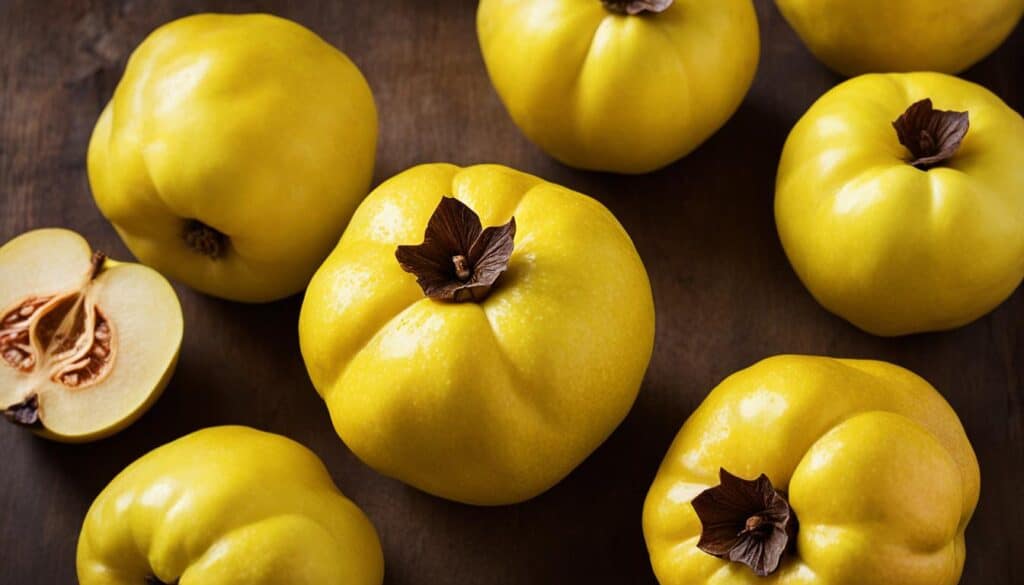
Quinces are often featured in traditional dishes around the world. In Moroccan cuisine, quince is used in savory tagines, while in Spanish cuisine, it is frequently found in quince paste, known as “membrillo,” which pairs well with cheese and crackers.
Health Benefits of Quince
Quinces offer several health benefits due to their rich nutritional content. They are a good source of dietary fiber, vitamin C, and antioxidants. The fiber in quinces supports digestive health, while vitamin C boosts the immune system and promotes collagen production.
Additionally, quinces contain phytonutrients, such as phenolic compounds, which have antioxidant properties. These compounds help protect the body against damage caused by harmful free radicals and may have anti-inflammatory effects.
| Nutrient | Amount per 100g |
|---|---|
| Calories | 57 |
| Carbohydrates | 15g |
| Fiber | 1.9g |
| Vitamin C | 15.6mg |
| Antioxidants | High |
Quinces can be a delightful addition to your culinary repertoire, whether used as a substitute for persimmons or as a unique ingredient in their own right. The next time you come across quinces at your local grocery store or farmer’s market, consider bringing this versatile fruit into your kitchen and exploring its delicious possibilities!
Orange Peach Tomatoes
When it comes to finding fruit alternatives to persimmons, one unexpected option to consider is orange peach tomatoes. These vibrant tomatoes bear a striking resemblance to fully ripe persimmons in appearance, making them a great substitute in recipes that call for this unique fruit.
Orange peach tomatoes not only bring a touch of visual appeal to your dishes but also offer a delightful burst of flavor. They have a pleasantly sweet and juicy taste that complements both sweet and savory culinary creations. Whether you’re looking to whip up a tangy salsa or a delectable homemade jam, these tomatoes can add a unique twist to your recipes.
Not only are orange peach tomatoes versatile, but they also offer various health benefits. They are an excellent source of vitamin C, antioxidants, and other essential nutrients that support overall well-being. Including these nutritious tomatoes in your diet contributes to a vibrant and flavorful culinary experience.
“Orange peach tomatoes are a unique and flavorful alternative to persimmons in recipes. Their vibrant color and juicy sweetness add an exciting twist to both sweet and savory dishes.” – Expert Home Chef
If you’re ready to incorporate orange peach tomatoes into your cooking, here are some ideas to inspire you:
Create a Fresh and Tangy Salsa
Orange peach tomatoes serve as the perfect base for a refreshing homemade salsa. Dice the tomatoes and combine them with finely chopped onions, cilantro, jalapenos, and a squeeze of fresh lime juice. Season with salt and pepper to taste. This vibrant salsa pairs well with tortilla chips, tacos, or grilled meats.
Make a Flavorful Tomato Jam
Transform orange peach tomatoes into a luscious jam that can elevate your breakfast or dessert. Simmer the tomatoes with sugar, lemon juice, and a touch of cinnamon until thick and glossy. Spread this delightful jam on toast, scones, or even use it as a glaze for roasted meats.
With their resemblance to persimmons and their versatile flavor, orange peach tomatoes offer a creative way to enhance your culinary repertoire. Explore the possibilities and experiment with these delicious tomatoes in your favorite recipes.
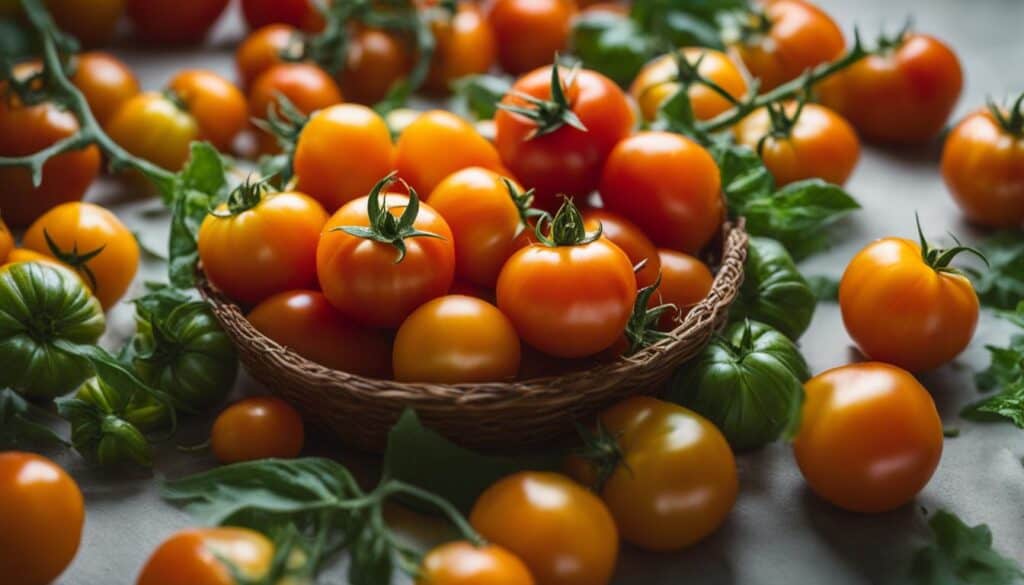
| Benefits of Orange Peach Tomatoes | Ways to Use Orange Peach Tomatoes |
|---|---|
|
|
Apricots
Apricots are a fruit that shares similarities with persimmons in terms of taste. They have a sweet flavor and can be used as a substitute for persimmons in various recipes, including baked goods. Dried apricots work particularly well in baking since they retain their texture and do not break down easily.
Benefits of Using Apricots as Persimmon Substitutes:
- High in vitamin A, promoting healthy vision
- Good source of dietary fiber, aiding digestion
- Rich in antioxidants, protecting against cell damage
- Contain essential minerals like potassium and magnesium
Whether you’re looking to replace persimmons in a pie, bread, or jam recipe, apricots provide a similar sweet flavor and can enhance your culinary creations. Consider using dried apricots as a tasty addition to your trail mix or granola bars.
I love using dried apricots in my persimmon bread recipe. The natural sweetness and chewy texture are perfect for adding some extra flavor and moisture. It’s a delightful twist on a classic favorite! – Emilia Rodriguez, Home Baker
Apricot Nutrition Facts:
| Nutrient | Amount per 100g |
|---|---|
| Calories | 48 |
| Carbohydrates | 12g |
| Fiber | 2g |
| Fat | 0g |
| Protein | 1g |
| Vitamin A | 13% of the Daily Value (DV) |
| Vitamin C | 16% of the DV |
| Potassium | 259mg |
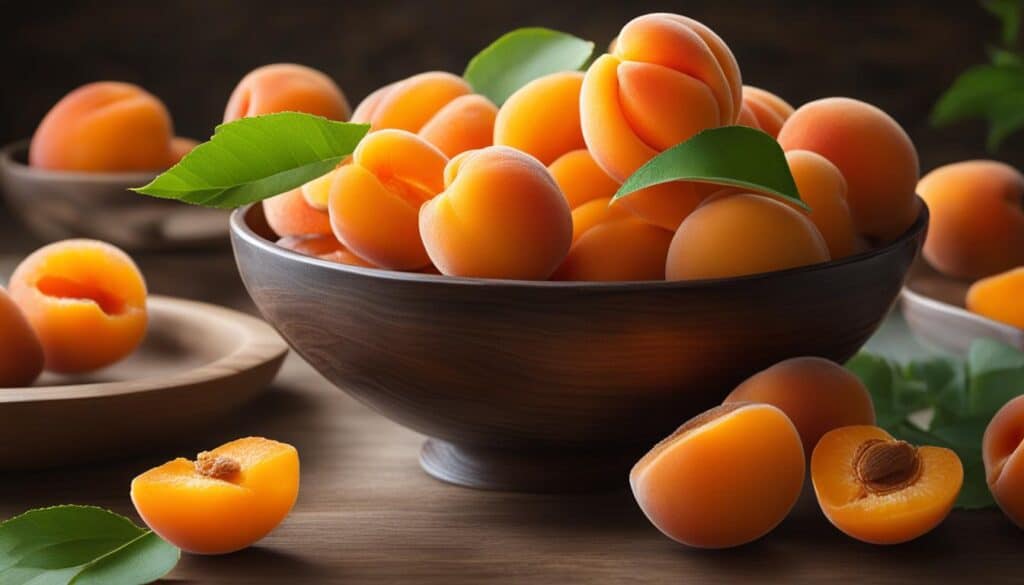
Mangoes
When it comes to finding a fruit similar to persimmon, mangoes are a delightful alternative. These tropical fruits have a similar taste to ripe persimmons and are known for their sweet, juicy flesh. Whether you’re looking to substitute persimmons in a recipe or simply enjoy the delicious flavors of mangoes on their own, they are a versatile and flavorful option.
One thing to keep in mind when using mangoes as a persimmon alternative is their slightly higher acidity. Persimmons tend to have a milder taste, so you may need to adjust the sugar levels in your recipe accordingly. However, the vibrant flavor and juicy texture of mangoes make them a fantastic stand-in for persimmons in various culinary creations.
Here is a delectable recipe that showcases the unique flavors of both mangoes and persimmons:
| Mango and Persimmon Salad |
|---|
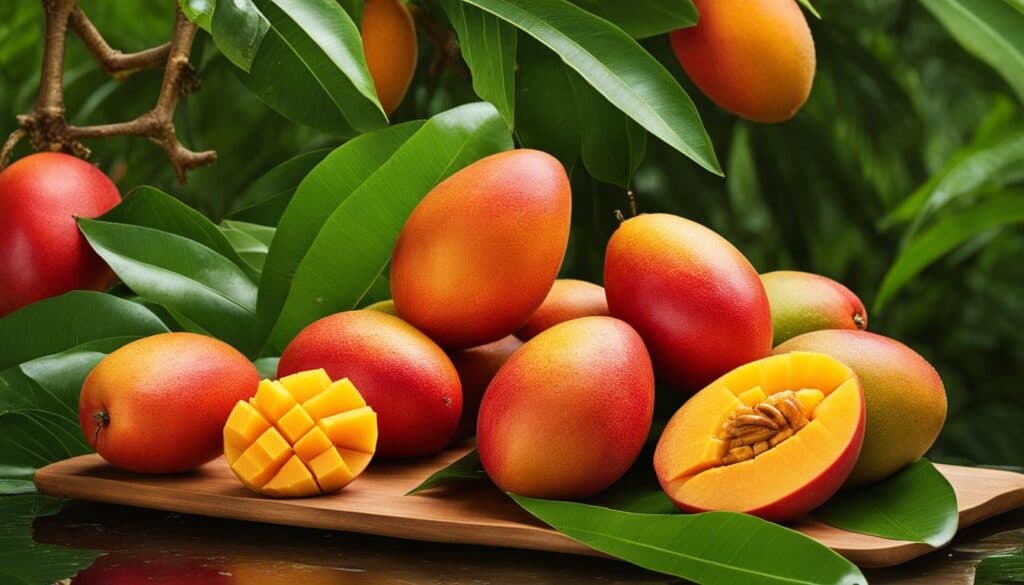 |
|
|
In a large bowl, combine the diced mangoes, sliced persimmons, arugula, feta cheese, and fresh mint. Drizzle the balsamic glaze over the salad and gently toss to coat all the ingredients. Season with salt and pepper to taste. Serve immediately and enjoy the refreshing flavors of this mango and persimmon salad! |
Papayas
When it comes to finding persimmon alternatives, don’t overlook papayas. These tropical fruits are not only delicious but also offer a similar taste and texture to ripe persimmons. Whether you’re looking to add a sweet and juicy element to your dishes or tenderize meat, papayas have got you covered.
For those seeking a sweet and refreshing snack, papayas can be enjoyed on their own or added to fruit salads. Their vibrant orange flesh and tropical aroma make them an appealing choice.
“Papayas are a versatile fruit that can be used in both sweet and savory dishes. Their unique taste and texture make them a great substitute for persimmons.”
If you’re in the mood for a savory dish, papayas can also be used as a meat tenderizer. They contain enzymes, such as papain, that can break down tough meat fibers, resulting in a more tender and flavorful dish. Try marinating your favorite cuts of meat with papaya juice or puree for a delicious and tender outcome.
Papaya Nutritional Information
Papayas are not only tasty but also packed with essential nutrients. Here’s a closer look at the nutritional profile of papayas:
| Nutrient | Amount per 100g |
|---|---|
| Calories | 43 |
| Protein | 0.5g |
| Carbohydrates | 11g |
| Fiber | 1.7g |
| Fat | 0.3g |
| Vitamin C | 61.8mg |
| Potassium | 182mg |
| Vitamin A | 47µg |
Papayas are a great source of vitamin C, which supports immune health, and vitamin A, which promotes healthy vision. They also provide dietary fiber, which aids digestion, and potassium, which helps regulate blood pressure. With their low calorie and fat content, papayas make a guilt-free addition to your diet.
Celebrate the versatility and nutritional benefits of papayas by incorporating them into your meals. Whether you’re seeking a persimmon substitute or simply looking to explore new flavors, papayas are an excellent choice.
Pears
Pears are a delightful fruit that can be used as a substitute for persimmons in various recipes. Their delicate and sweet flavor makes them a perfect choice for salads, baked dishes, and even as toppings for yogurt and oatmeal. Pears add a fresh and sweet taste to your dishes, similar to persimmons.
If you’re looking for a refreshing twist to your salad, try adding sliced pears for a burst of sweetness. They pair well with greens, nuts, and cheeses, creating a harmonious blend of flavors. Additionally, pears can be baked into pies, tarts, or crumbles, adding a natural sweetness and moisture to your desserts.
When it comes to breakfast, pears make a fantastic topping for yogurt or oatmeal. Whether diced or thinly sliced, they bring a refreshing and juicy element to your morning meal. You can also incorporate pears into smoothies for a creamier consistency and added natural sweetness.
With their versatility and delicate flavor, pears are an excellent alternative to persimmons. They offer a similar taste profile and can be used in a variety of ways, allowing you to explore new culinary possibilities. Don’t be afraid to experiment with pears in your favorite persimmon recipes or try them in new dishes for a delightful twist.
| Recipe Ideas Using Pears as a Persimmon Substitute |
|---|
| 1. Pear and Arugula Salad with Candied Pecans |
| 2. Baked Pear Crisp with Cinnamon-Oat Topping |
| 3. Pear and Gorgonzola Flatbread |
| 4. Pear and Almond Butter Overnight Oats |
Sweet Potatoes
Sweet potatoes are a versatile ingredient that can be used as a delicious substitute for persimmons in savory dishes. With their naturally sweet taste and soft texture, sweet potatoes provide a unique flavor profile that complements a wide range of recipes.
Whether you’re making stews, curries, or roasted vegetables, sweet potatoes can add a touch of sweetness and depth to your dishes. Their slightly earthy and caramel-like notes create a warm and comforting taste sensation that pairs well with a variety of ingredients.
If you enjoy cooking with sweet potatoes, you’ll be happy to know that they are also nutritionally rich. They are a great source of dietary fiber, vitamins, and minerals, making them a healthy option for your meals.
Let’s explore some ways to incorporate sweet potatoes into your cooking:
- Roasted sweet potato wedges: Cut sweet potatoes into wedges, toss them with olive oil, salt, and your favorite spices, and roast them until crispy on the outside and soft on the inside.
- Sweet potato curry: Combine sweet potatoes with chickpeas, coconut milk, and a blend of aromatic spices to create a flavorful and hearty curry.
- Mashed sweet potatoes: Boil sweet potatoes until tender, drain, and mash them with butter, salt, and a touch of cinnamon or nutmeg for a comforting side dish.
- Sweet potato and black bean tacos: Sauté sweet potatoes with black beans, onions, and spices, then serve them in soft tortillas topped with fresh salsa and avocado.
“Sweet potatoes offer a naturally sweet and satisfying flavor to savory dishes, making them a perfect substitute for persimmons.”
Incorporating sweet potatoes into your meals not only adds a delicious twist but also provides a host of nutritional benefits. Enjoy the unique taste and versatility of sweet potatoes in your cooking adventures!
Conclusion
If you’re unable to find persimmons or they’re out of season, don’t worry – there are plenty of fruits that make excellent substitutes or alternatives. Medlar, black sapote, sapodilla, quince, orange peach tomatoes, apricots, mangoes, papayas, pears, and sweet potatoes are just a few persimmon-like options that can offer similar taste profiles and textures. These fruits can be incorporated into various culinary applications, giving your dishes a delightful twist and adding variety to your meals.
Don’t be afraid to experiment with different substitutions to find the ones you enjoy most. Whether you’re looking for a fruit with a velvety texture like medlar, a caramel-infused flavor like black sapote, or a sweet and grainy flesh like sapodilla, there’s a fruit out there that will satisfy your persimmon cravings.
So go ahead and explore the world of fruits similar to persimmon. With these persimmon substitutes and alternatives, you can continue to enjoy the unique flavors and textures that persimmons offer, even when they’re not readily available. Happy experimenting!
FAQ
What are some fruits similar to persimmon?
The fruits that are similar to persimmon include medlar, black sapote, sapodilla, quince, orange peach tomatoes, apricots, mangoes, papayas, pears, and sweet potatoes.
What is medlar?
Medlar is a fruit that is only edible when it is fully ripe. It has a velvety texture and a sweet yet acidic taste, similar to persimmons.
What is black sapote?
Black sapote is a fruit that has a soft and squidgy texture, similar to persimmons. It has a flavor profile that is reminiscent of chocolate pudding with a hint of caramel.
What is sapodilla?
Sapodilla is a fruit that shares similarities with persimmons in terms of appearance. It has a sweet and grainy flesh, similar to a pear mixed with brown sugar.
What is quince?
Quince is a fruit that may not resemble persimmons in appearance but shares a similar flavor profile. Both fruits have sweet and acidic notes, with quinces being grainier in texture compared to the softer and slipperier persimmon flesh.
What are orange peach tomatoes?
Orange peach tomatoes are a variety of tomatoes that resemble fully ripe persimmons in appearance. They have a sweet and juicy flavor and can be used in both sweet and savory recipes.
Can apricots be used as a substitute for persimmons?
Yes, apricots are a fruit that shares similarities with persimmons in terms of taste. They have a sweet flavor and can be used as a substitute for persimmons in various recipes, including baked goods.
Are mangoes similar to persimmons?
Yes, mangoes are tropical fruits that have a similar taste to ripe persimmons. They are sweet and juicy and can be used as a substitute in recipes that call for persimmons.
Are papayas a good substitute for persimmons?
Yes, papayas have a sweet and juicy flavor, similar to ripe persimmons, and can be used in both sweet and savory dishes. They also have enzymes that tenderize meat, making them a versatile ingredient in cooking.
Can pears be used as an alternative to persimmons?
Yes, pears are delicate and sweet fruits that make a great substitute for persimmons. They can be used in salads, baked dishes, and as toppings for yogurt and oatmeal.
How can sweet potatoes be used as a substitute for persimmons?
Sweet potatoes have a sweet taste and soft texture, making them a great addition to stews, curries, and roasted vegetables. They work well as a substitute for persimmons in savory dishes.
What are some fruits similar to persimmon?
The fruits that are similar to persimmon include medlar, black sapote, sapodilla, quince, orange peach tomatoes, apricots, mangoes, papayas, pears, and sweet potatoes.
Can these fruits be used as alternatives to persimmons?
Yes, these fruits can be used as substitutes or alternatives to persimmons in various culinary applications. They can add variety and flavor to your dishes.

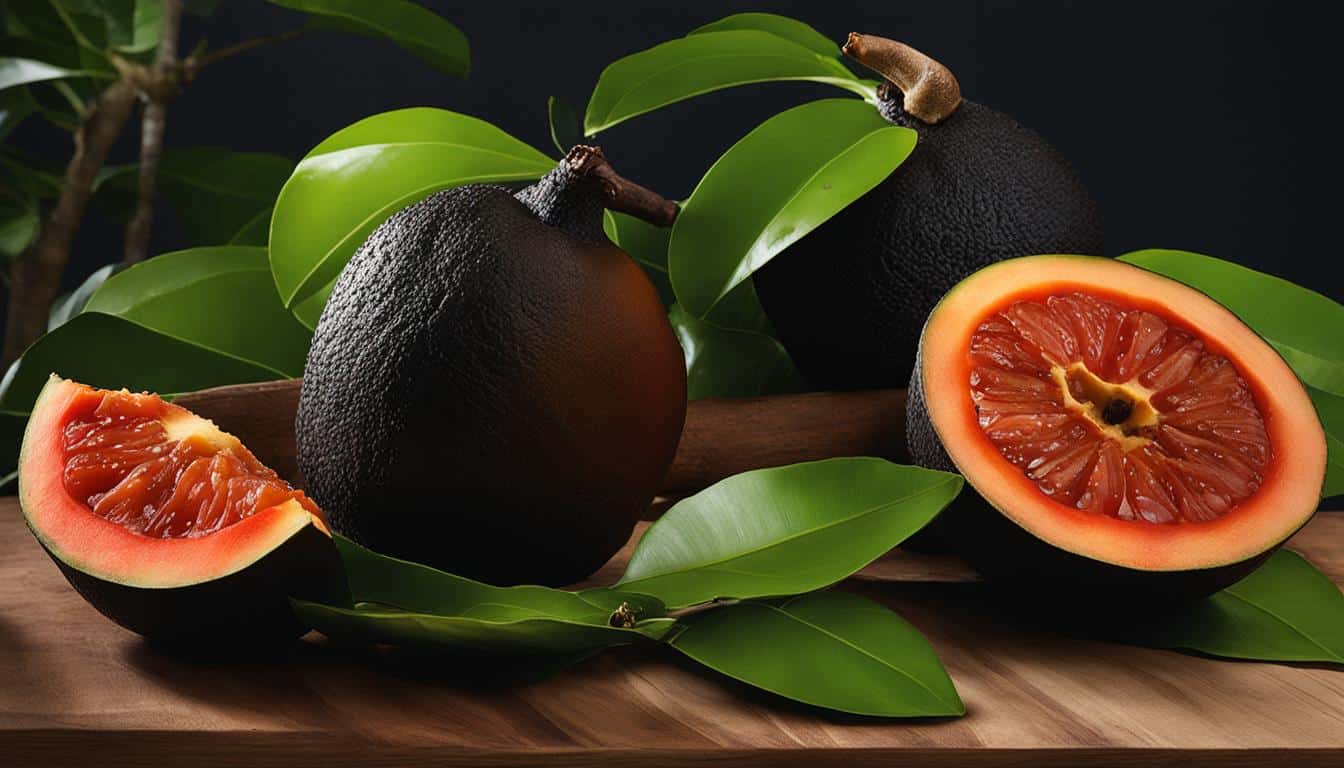



Leave a Reply